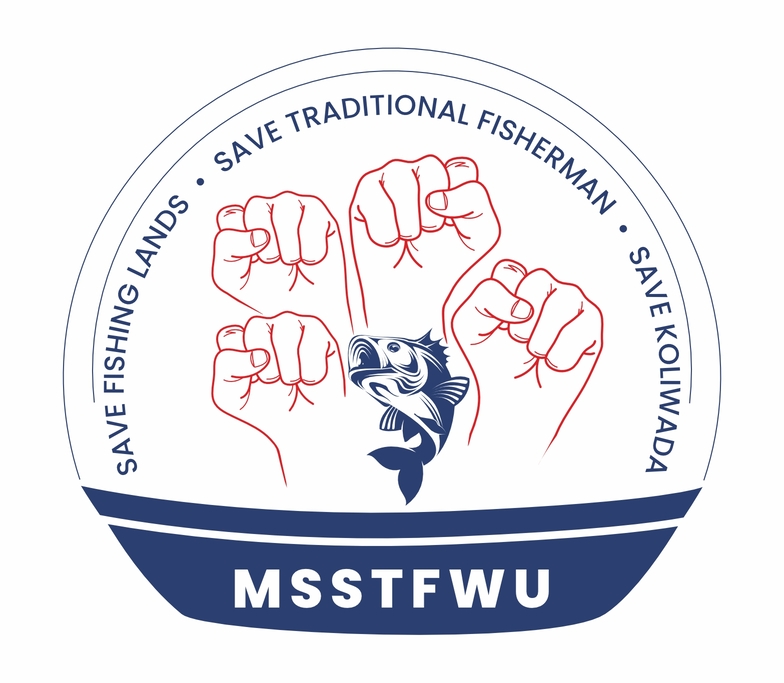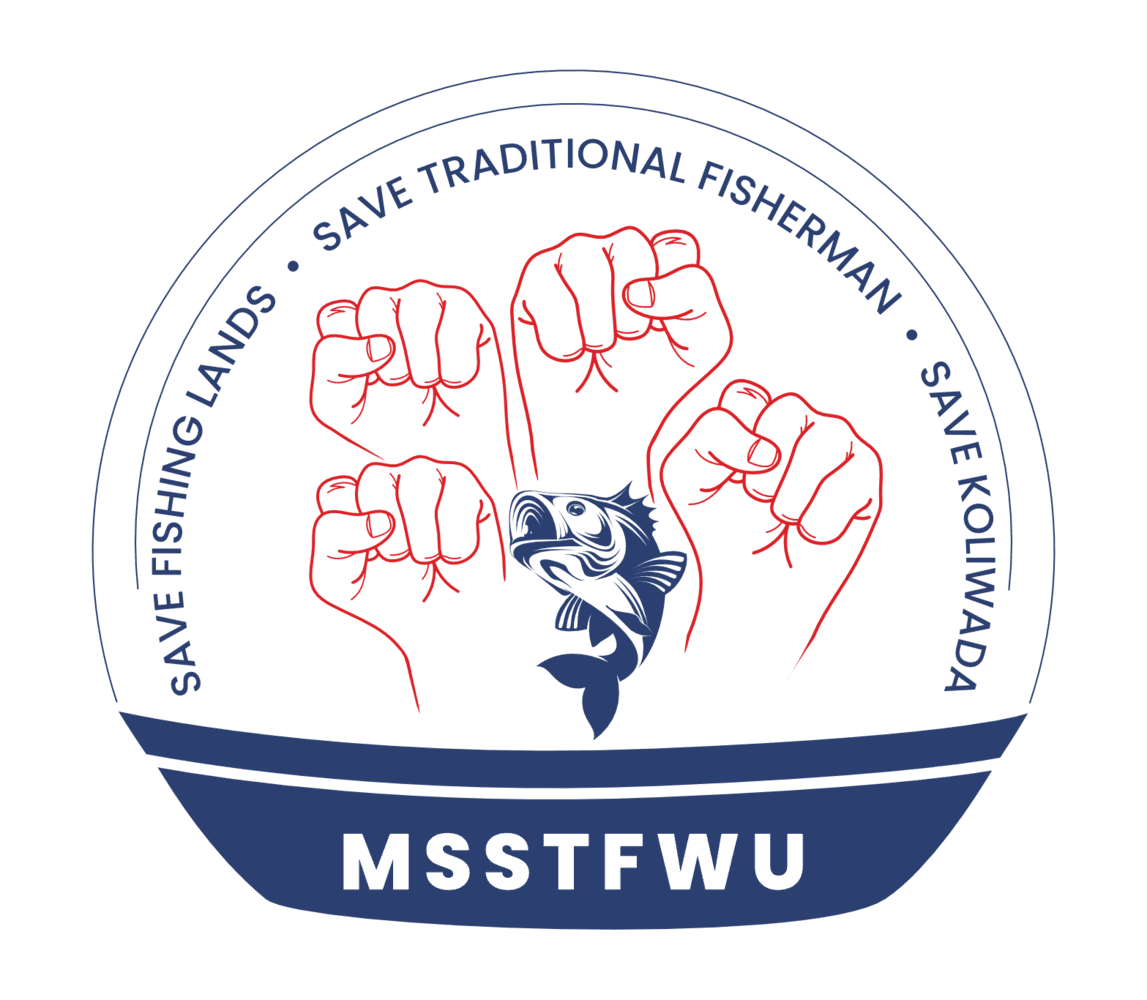About Us
Upholding Tradition: The story of unwavering resilience, a tale of perseverance and determination
The 17-Year Battle of Hanuman Koliwada, Uran, Belpada, and Gavhan Koliwada Fishermen
In the serene coastal villages of Hanuman Koliwada, Uran, Belpada, and Gavhan Koliwada, nestled along the shores of Raigad district, a community’s way of life was under threat. For 17 years, the traditional fishermen of these villages faced a formidable challenge – the loss of their livelihood due to the expansion plans of the Navi Mumbai Special Economic Zone (NMSEZ), facilitated by the Jawaharlal Nehru Port Trust (JNPT). NMSEZ had planned to construct jetties in the fishing ground between Mora Pravashi jetty and JNPT Sheva. There was an agreement between the two companies NMSEZ and JNPT to give the ground rent of that fishing land to JNPT. Hence JNPT had given permission to NMSEZ to construct passenger and other jetties. However, due to this project, the destruction of fishing land started, over which the fishermen community’s livelihood was dependent. Even the Environment Impact Studies (EIS) also pinpointed the negative effects of this development on fishermen community.
So they asked the JNPT administration for the compensation of the fishing land. However, the fishermen were not compensated. Due to this, injustice was done to the 1630 fishermen families of four villages namely Hanuman Koliwada, Uran Koliwada, Belpada Koliwada, Gavan Koliwada. As a result, the said families started their fight to get the compensation of the fishing land and to be rehabilitated.
They held multiple meetings and started to spread awareness among all the fishermen community. Simultaneously, it was decided to legally challenge the project. They sought counsel from Mr P. B. Sawant (retired Supreme court judge) and Mr. Kolse-patil (retired high court judge). As per their guidance, the community started to prepare for legal fight.
Foundation of Committee
The year was 2005 when the winds of change swept through the tranquil shores of the Koliwada villages. However, scattered and unorganized, their efforts yielded little success initially. As it was just a beginning, their efforts were not getting the much needed public exposure. So, the fishermen, realizing the imminent threat to their way of life, embarked on a journey of collective action.
As a result, they started to held timely meetings to spread awareness about the fight. But there was no definite direction. Finally, in the year 2006, the fishermen of 4 Koliwada villages came together in the Devi’s temple at Collector Alibaug and formed a non-political traditional fishermen rescue action committee. With this pivotal step, a fierce battle for justice commenced, fueled by the unwavering determination of the fishermen brothers.
Though it was costly to fight against the mighty companies, the committee decided to not opt for crowdfunding. As it may create misconceptions and doubts about fund management among the community which would have ultimately weakened the battle. So to avoid this, the committee decided that only selective representatives will travel with their own expenses.
A long-fought battle
On The path to justice was fraught with obstacles, yet the fishermen remained undeterred. Recognizing the importance of solid evidence, a committee comprising representatives from the revenue and fisheries departments was appointed by the Collector of Raigad. This committee meticulously documented the impact of NMSEZ’s expansion on the fishing communities, compiling satellite images and reports to substantiate their claims. This report was submitted to Collector of Raigad. The report highlighted that the four companies CIDCO, JNPT, ONGC, and NMSEZ have destroyed the fishing land of four villages.
However, bureaucratic indifference and legal complexities posed formidable challenges along the way. Even though the office-bearers of the committee have worn down the steps of the guardian minister and the minister of the concerned department to get their demands met, relief has not been achieved. Despite their best efforts, justice remained elusive. Undeterred, the committee persisted, tirelessly advocating for their cause at every available opportunity.
Their quest for justice transcended national borders, as they took their plight to the World Human Rights Commission in Switzerland in 2013. A hearing was held in Switzerland every six months. All necessary proofs were also being sent. Armed with irrefutable evidence, they shed light on the violations of traditional fishermen’s rights in India, garnering international support for their cause.
Simultaneously, legal avenues were pursued closer to home. The National Green Tribunal (NGT) Court in Pune became a battleground for their struggle, as the fishermen vehemently contested the injustice inflicted upon them. Their resolve only strengthened when the NGT Pune Court, on 11th October 2013, stayed the operations of the companies responsible for their plight.
Undeterred by legal maneuvering, the fishermen brothers took their fight all the way to the highest echelons of justice – the Supreme Court of India. With conviction and perseverance, they presented their case before the apex court, compelling it to acknowledge their plight. In May 2015, a petition was filed in the Supreme Court seeking compensation for the 1,630 project-affected traditional families.
But their battle did not end there. Realizing the importance of international advocacy, the committee reached out to the World Bank in Washington, highlighting the adverse impacts of so-called development projects on local communities. Their efforts bore fruit as international stakeholders began to take notice of their struggle, lending further credence to their cause. In this way, the fight of the fishermen continued in different ways.
Despite setbacks and challenges, the fishermen remained resolute in their pursuit of justice. The Committee’s relentless efforts led to a significant breakthrough when the JNPT requested Supreme Court to withdraw the appeal. The Supreme Court agreed and mandated the Collector of Raigad to oversee the distribution of compensation, including interest, to the 1,630 families. Additionally, each family would receive financial support from ONGC and CIDCO, amounting to a total of 9 lakh rupees per family.
This landmark decision, handed down on 14th December 2022, marked a turning point in their long-fought battle.
International Intervention
The fishermen’s struggle did not go unnoticed on the global stage as well. Their advocacy efforts at the World Human Rights Commission and the World Bank garnered international recognition, shedding light on the plight of traditional fishermen facing displacement due to unchecked development. This global exposure fueled and strengthened the battle of fishermen.
Victory of Determination over rampant Development
After 17 years of tireless struggle, justice finally dawned upon the fishermen of Hanuman Koliwada, Uran Koliwada, Belpada Koliwada, and Gavhan Koliwada. The Supreme Court’s order to compensate the affected families marked the culmination of their arduous journey.
Through their unwavering resilience and collective action, the fishermen of these four villages stood as a testament to the power of community solidarity. Their hard-fought battle not only secured compensation for their losses but also reaffirmed the importance of preserving traditional ways of life in the face of rampant development.
As the waves lapped against the shores of Hanuman Koliwada, Uran Koliwada, Belpada Koliwada, and Gavhan Koliwada, they bore witness to a triumph of the human spirit – a victory won through perseverance, determination, and unwavering unity.

